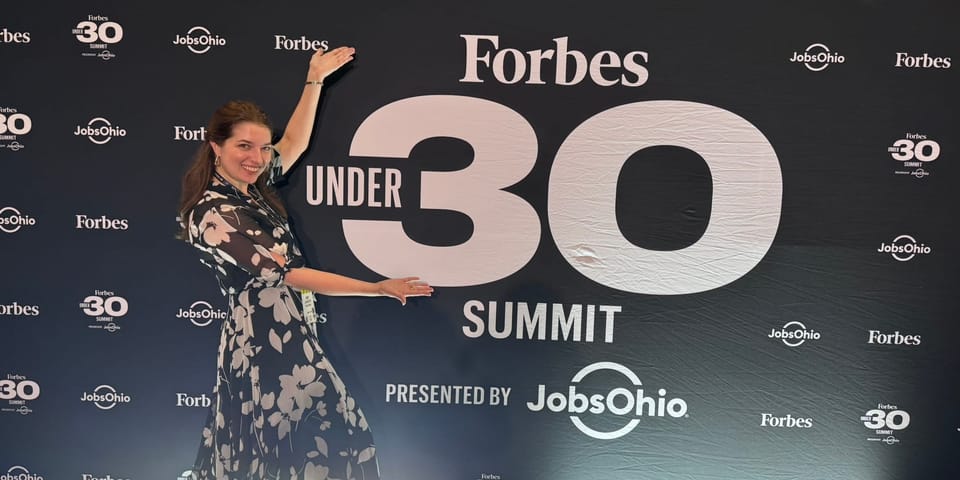
(a field report from inside the brand accelerator formerly known as a summit)
I wanted to love it. I really did. I packed a shared suitcase full of “business casual” (hers) and “emotionally exhausted producer chic” (mine), flew to Ohio, and told myself to be open-minded. Working with my mentee has been one of the cleanest joys in my career – she’s a 20-something senior software engineer I’ve been producing for the last year and a half, absurdly talented, a published author on blind accessibility in games, and the kind of person who makes you believe the future of this industry is salvageable. We submitted her 30 Under 30 application months ago – no payment, just the usual public nomination, essays and editorial vetting – and I wanted this trip to teach her the art of rooms: how to walk into one, how to find your people, how to leave with a new map.
(Note: Forbes says they start with public nominations and then pull in editors and outside judges – so yes, you can self-nominate or nominate others; no, there isn’t a paywall to get considered. The myth persists, but the application is a form, not a fee.)
The tone was set before the coffee got cold
The Summit opened with a featured interview with Vivek Ramaswamy – yep, the anti‑ESG biotech-and-asset-management guy who ran for President of the United States and is now a declared 2026 candidate for Ohio governor. The official materials list him right there among the headliners. JobsOhio, the state’s economic development arm, is the presenting sponsor, and the whole thing is pitched as a celebration of entrepreneurial momentum in Columbus. It’s slick, loud, and aggressively optimistic in the way only a publicly subsidized pep rally can be.
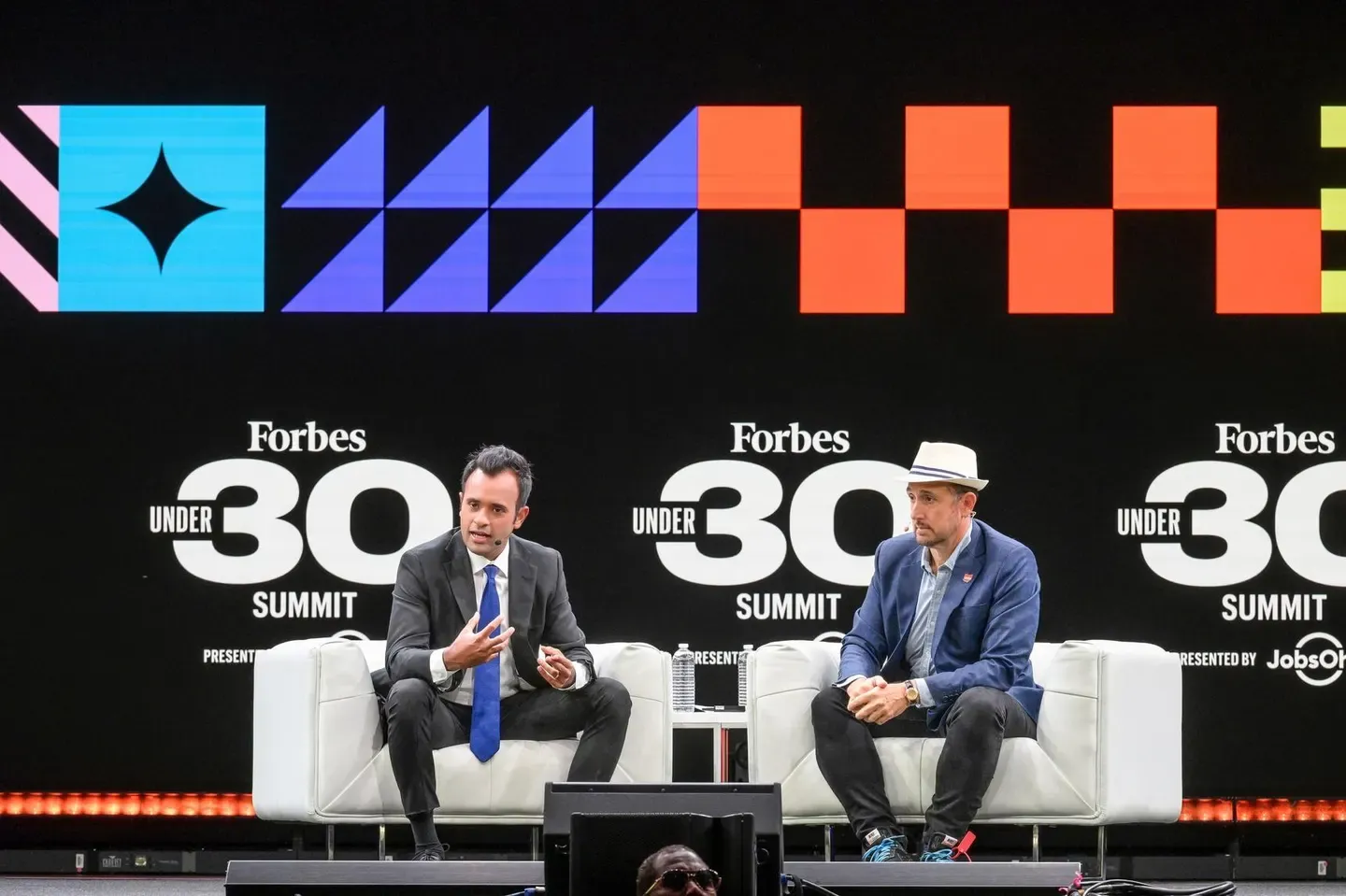
Ramaswamy has a consistent message: capitalism is the cure, stakeholder capitalism is a disease, and executives shouldn’t launder politics through companies. He’s built a whole worldview around that argument. Whether or not you agree, the effect in the room was unmistakable: we aren’t just building companies; we’re building a culture where markets become morality. That framing took the oxygen.
Then a speaker was escorted out
A few sessions after Vivek’s kickoff, creator and author Khalil Green – an Under 30 honoree invited for a five‑minute “Spotlight” talk – was removed from the venue by security. In his account, he used his stage time to speak about gun violence and unveil an alternate “30 Under 30: Gun Violence Edition,” honoring 30 people killed before 30; as he wrapped, volunteers quietly handed out the magazine in the audience. Minutes later, security confiscated his badge and escorted him out; guards began taking magazines from attendees around the venue. It was jarring, not just because it happened fast, but because the content was sober and humane – and it followed a morning that had already made politics the water we were all swimming in.
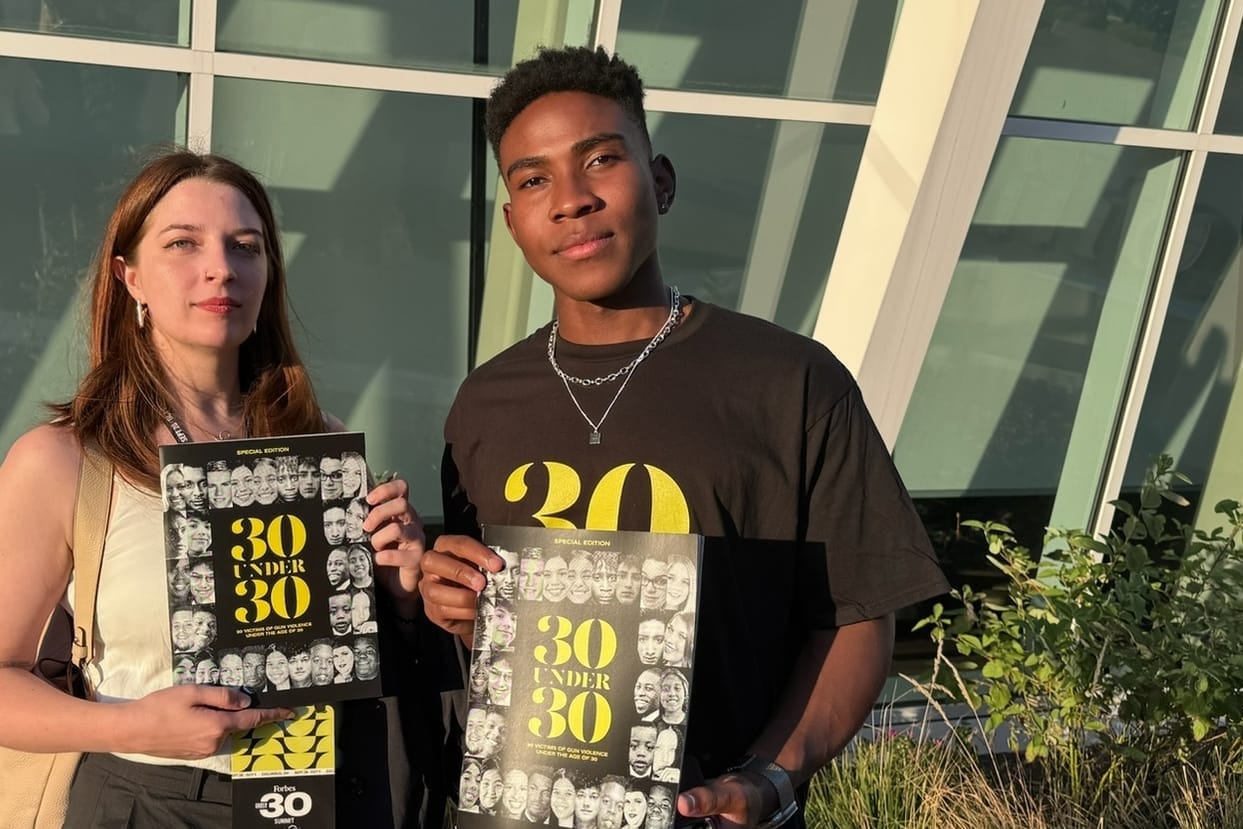
The next day, after he went public and texted his contacts, Forbes apologized and returned his badge. Their team told him the removal wasn’t authorized by Forbes and attributed it to security contractors; they also acknowledged telling security to seize the magazines as “unapproved,” and later offered to let distribution resume near the end of the conference. Whatever you make of the “miscommunication,” the signal in the room was clear: say something careful and costly about real deaths, and the machinery treats paper like a threat. They even neglected to mention him in their official coverage of the event. We found Khalil outside on a corner, handing the magazines to whoever would take one. We chatted for a while. It was disheartening – and clarifying.
You could feel how all of this cascaded into the rest of programming – everything downstream started to taste like a personal branding electrolyte drink. Forbes’s own hype copy promised “insider access to the business playbooks of billionaires.” It’s honest advertising, I’ll give them that. But once you’re sitting there, you realize what a strange promise that is to make to a crowd of twenty‑somethings. Whose playbook? What game? And what happens to the people who don’t want to win that way?
The vibe: build the brand, then build the thing (maybe)
I met a founder whose product converts accents in real time so offshore workers sound “more American” on the phone. The pitch was that it improves customer experience. I’m sure it also improves the plausible deniability of certain procurement decisions. (We didn’t stick around to hear the Q&A.)

At the evening kickoff, Lucy Guo – cofounder of Scale AI, newly named the world’s youngest self‑made woman billionaire this spring – played a DJ set for the Under 30 crowd after only starting to learn six months ago, according to her Instagram. The press material and photography confirm it; the set was a thing that happened. I don’t know what I expected; maybe something joyous. What I felt instead was the thesis of the entire evening: be talented, but more importantly, be a brand. (To her credit, she is legitimately newsworthy this year – her wealth milestone is real and widely reported.)
If that’s your north star, you probably had a great time. Many did. But sitting next to my mentee – who took a long flight to be here, borrowed my blazer, and has been building quietly brilliant things at a very high level – the dopamine didn’t land. We kept exchanging little looks that meant: Is it just us? (It wasn’t just us. A man we met at a bar across town, who helped set up the venue, nodded sympathetically when I told him why we’d come.)
A different summit in a different palace
Part of why this stung is that I’ve seen a version of Forbes that felt nourishing. A few months after I made the list, I flew to Abu Dhabi with my own mentor. We stayed on Saadiyat Island, swapped stories over late hotel coffees, and spent the week watching some of the most powerful women on the planet talk – plainly – about community, mentorship, and building bridges across generations. The whole thing is built for that: it runs around International Women’s Day and deliberately mixes “30 Under 30” with “50 Over 50” so the room skews intergenerational on purpose.
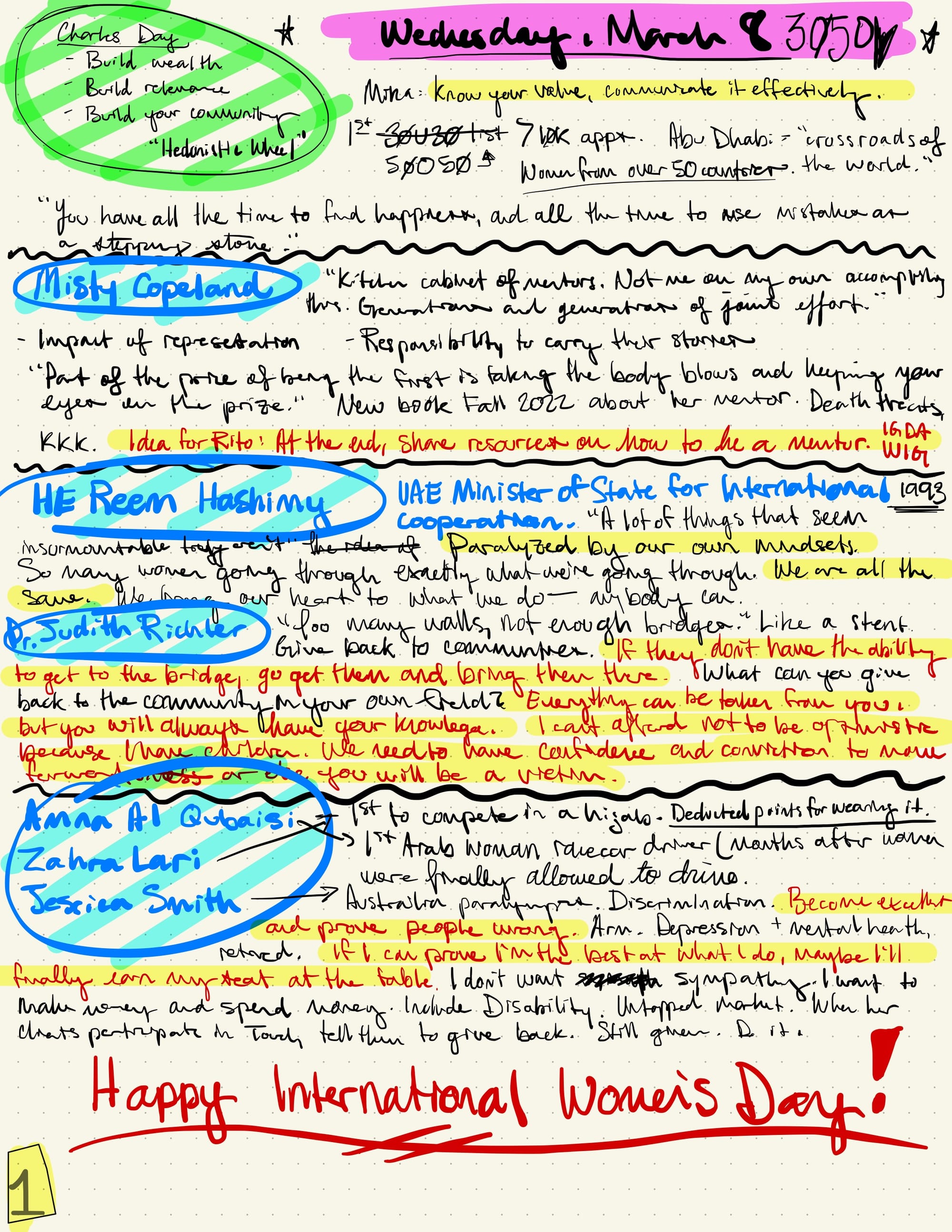
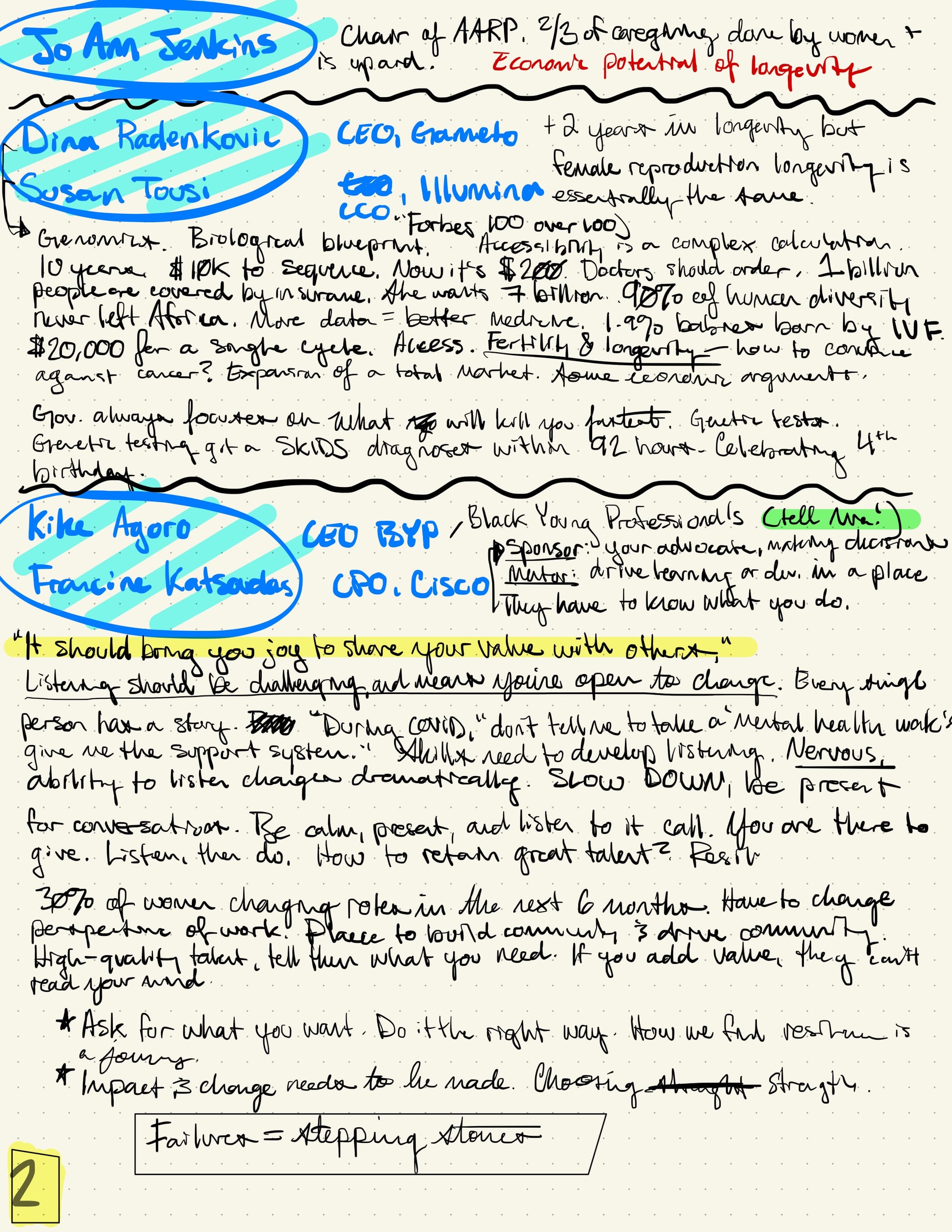
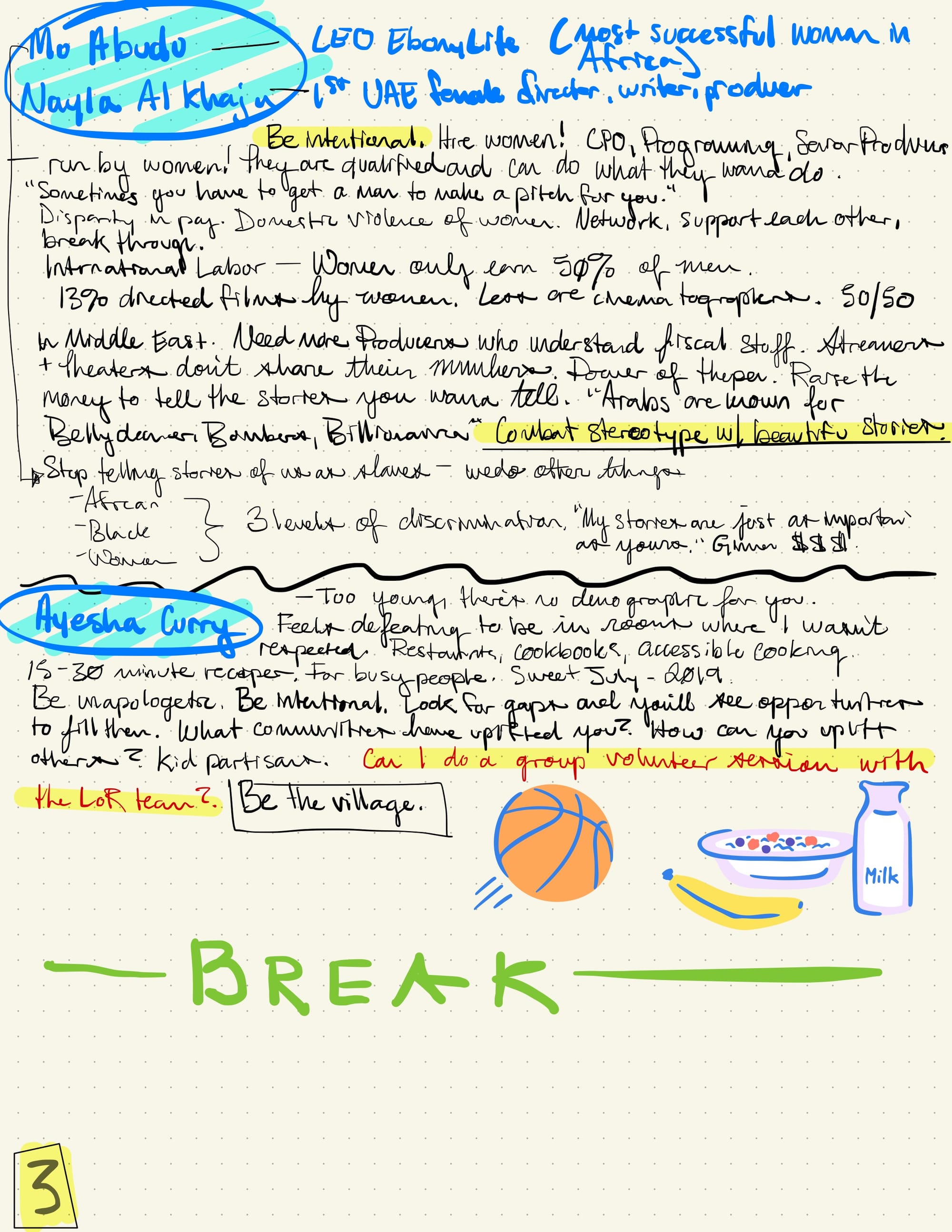
My handwritten notes from the 2023 Forbes Summit
The speaker slate matched the thesis. You didn’t have to squint to see the center of gravity: Hillary Clinton and other global heavyweights anchoring conversations that felt less like brand clinics and more like field briefings on how to do the work without losing your soul. It was the kind of programming where you leave with names, tactics, and three people you intend to help. I remember walking out with a full notebook and a quieter nervous system.
Even the settings conspired toward substance. Sessions and events were spread across Qasr Al Watan (the Presidential Palace), Louvre Abu Dhabi, and spaces on Saadiyat Island – iconic, yes, but used in service of the message rather than as a flex. It made the week feel like an invitation to belong to something larger, not a race to out‑optimize your personal brand. This wasn’t a funnel; it was a forum.
Being on the list, and the weird feeling afterward
I got 30 Under 30 a few years back. It felt easy in the sense that it was a form to fill out and essays to write and then a wait; I didn’t chase it with consultants or strategy decks. When it happened I felt proud, then complicated, then watched. Nothing about my life changed except one subtle thing: my imposter syndrome left earlier than it might have otherwise. Then the internet did what it does and reminded me of the “Forbes‑to‑prison pipeline.” The joke stings because it’s built on a nontrivial pile of real cases – and even Forbes has cheekily published a “Hall of Shame.”
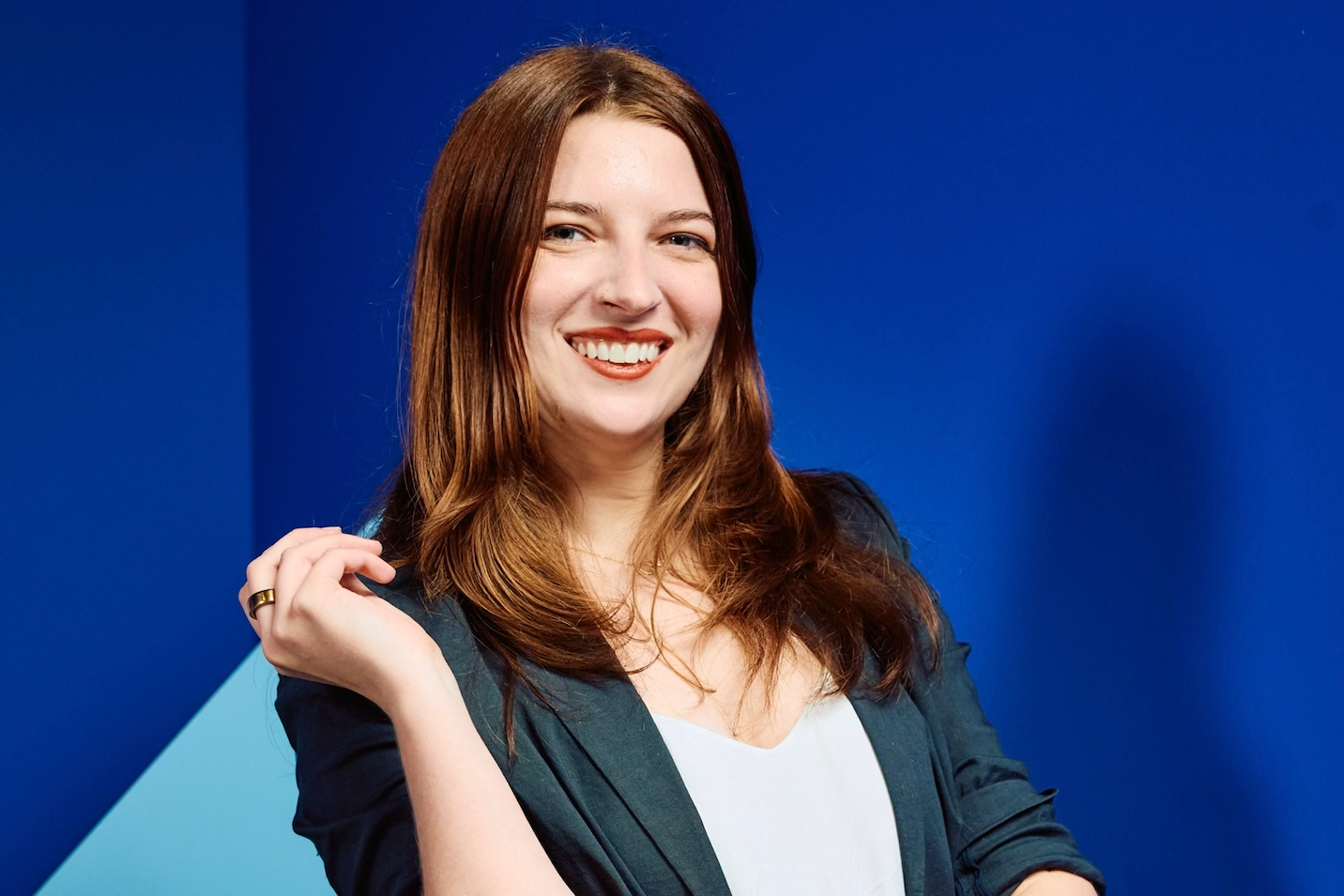
Charlie Javice’s sentencing this week only thickened the ambient cloud of skepticism. It’s not everyone, obviously, but it’s enough to warp the gravitational field around the brand.
If you’ve never bumped into the meme, Quartz has a tidy roll‑up of honorees who later faced charges or prison. I don’t bring it up to dunk on the list – plenty of people I adore are on it, and most are doing honest, important work. I mean, I’m on it and I’m pretty sure I’m not frauding anybody other than sneaking medicine into a dog's food bowl. I bring it up because when you’re actually in those rooms, you can feel how the incentives nudge: faster, shinier, more. Less stewardship, more spectacle.
The best talk we heard
Katherine Sizov (Strella) was the rare talk that felt like it had a spine and a soul. No influencer riffs, no morally ambiguous “growth hacks.” She walked us through a single, stubborn problem – perfectly good fruit going bad in storage because we don’t know when it wants to be eaten – and then showed the receipts.

Strella’s bio‑inspired sensors sit inside controlled‑atmosphere rooms and literally listen for ethylene, the ripening signal fruit emits, then turn that chemistry into decisions: open this room next; pack these bins today; wait on those pears until Friday. It’s logistics as kindness – toward farmers, toward packers, and toward the food itself. That was super fucking cool.
Aaaaand the talk right after: "Turning Content into Consumers: Using Social Media to Forge a Business Empire." Like girl, please bring the apple-lady back, we were learning cool stuff damn it.
Why we left
By day two, the structure of the event hardened: programming geared toward building your personal distribution, less toward building an actual practice. Some of that is useful. Most of it tasted like plastic fruit. My mentee and I took the meeting that mattered – the one that gave her a name and an email and some momentum – and then we rebooked our flights.

We didn’t bail because it was in Ohio. Columbus was lovely, actually, and the local hosting was generous. The Summit’s own materials emphasize the city crawl, the private concert, the networking, the whole curated immersion; you can feel the regional pride and the JobsOhio investment everywhere. We left because the signal‑to‑noise got inverted, and we just felt... icky, at the end of the day.
What I wish this room would say out loud
There’s a version of Under 30 that could be the antidote to the online pyramid scheme vibes. It would talk as much about stewardship as scale. It would make space for people whose dreams are measured in contribution, not headcount or ARR. It would celebrate the kid who shipped an accessibility feature to millions over the kid who turned a semester’s worth of TikToks into a term sheet.
I know: markets, sponsors, incentives. But still, what you spotlight teaches a generation how to keep score. And right now, it feels like a lot of rooms are teaching the wrong math.
The backdrop we can’t ignore
All of this is happening inside an American political moment that feels like a live‑wire. A candidate whose platform leans hard into “free markets fix it” headlined a summit underwritten by a state’s development arm that’s actively curating a story about opportunity. That’s not a conspiracy; it’s marketing. But when the keynote sermon is that capitalism is the cure for what ails us – and when that sermon is delivered by someone who’s spent years attacking “stakeholder capitalism” as a democratic poison – it narrows the imaginative range of the day.
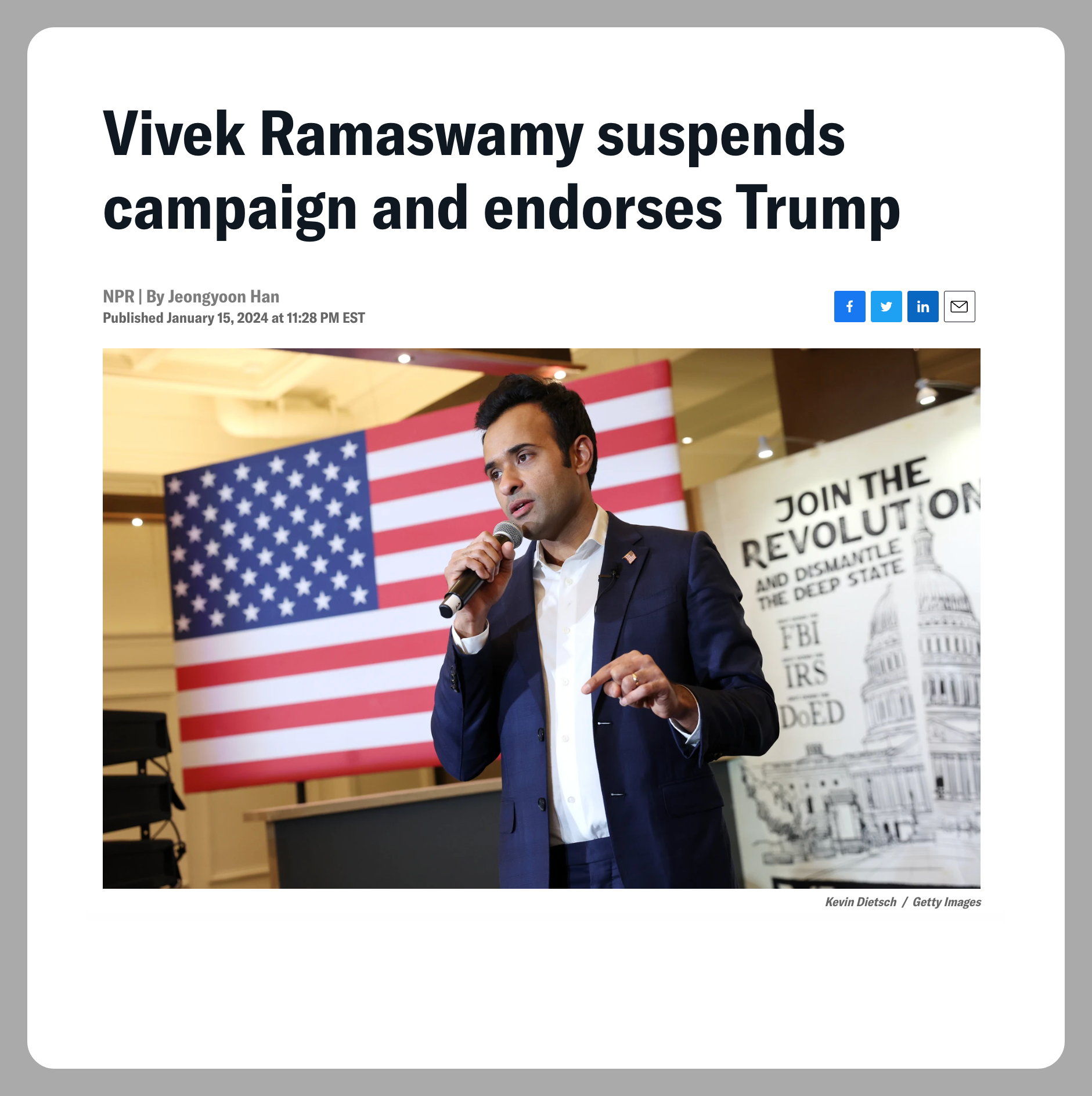
I keep thinking about the kids in the back row, trying to decide what kind of builder to become. If the loudest lesson is “be audacious enough to bend reality around your brand,” don’t be surprised if some portion optimizes for the shortest path to clout. We’ve all seen where that can land. (Again, see above re: Forbes-to-prison pipeline).
Mentorship as counter‑programming
Here’s the part that wasn’t plastic: sharing a suitcase with my mentee, swapping blazers, teaching her the micro‑rituals of talking to strangers who might change your career. Making an intro to an editor. Drawing the map for her, then handing her the pen.

Mentoring is the one place where my work self and my whole self don’t fight. There are a lot of things I really like about myself: I like making the pieces fit, I invest deeply in people, I see the branching paths, I fix what’s broken, and I trust my gut.
That, more than any panel, is why I left less cynical than I arrived. Not not cynical – the music‑festival‑meets‑accelerator energy is real, and ya girl is tired – but clearer about where I want to spend my time.
The small, slightly unhinged epiphany
On the flight home I thought about the essays I’ve been writing this year. In one, I argued that “care tasks are morally neutral. Pizza is morally neutral. Using whatever tools you have to keep yourself going isn’t wasteful—it’s survival.” I wrote that after a night of eating cold leftovers on the kitchen floor and calling it victory. In another, I used The Sims to practice the future I actually want: fewer highways, more trees, a house that rains on purpose. I even cracked a joke in there about the Forbes‑to‑prison pipeline while my Sim chose the criminal career path for the benefits. Maybe I’ve been writing this essay for months without knowing it.
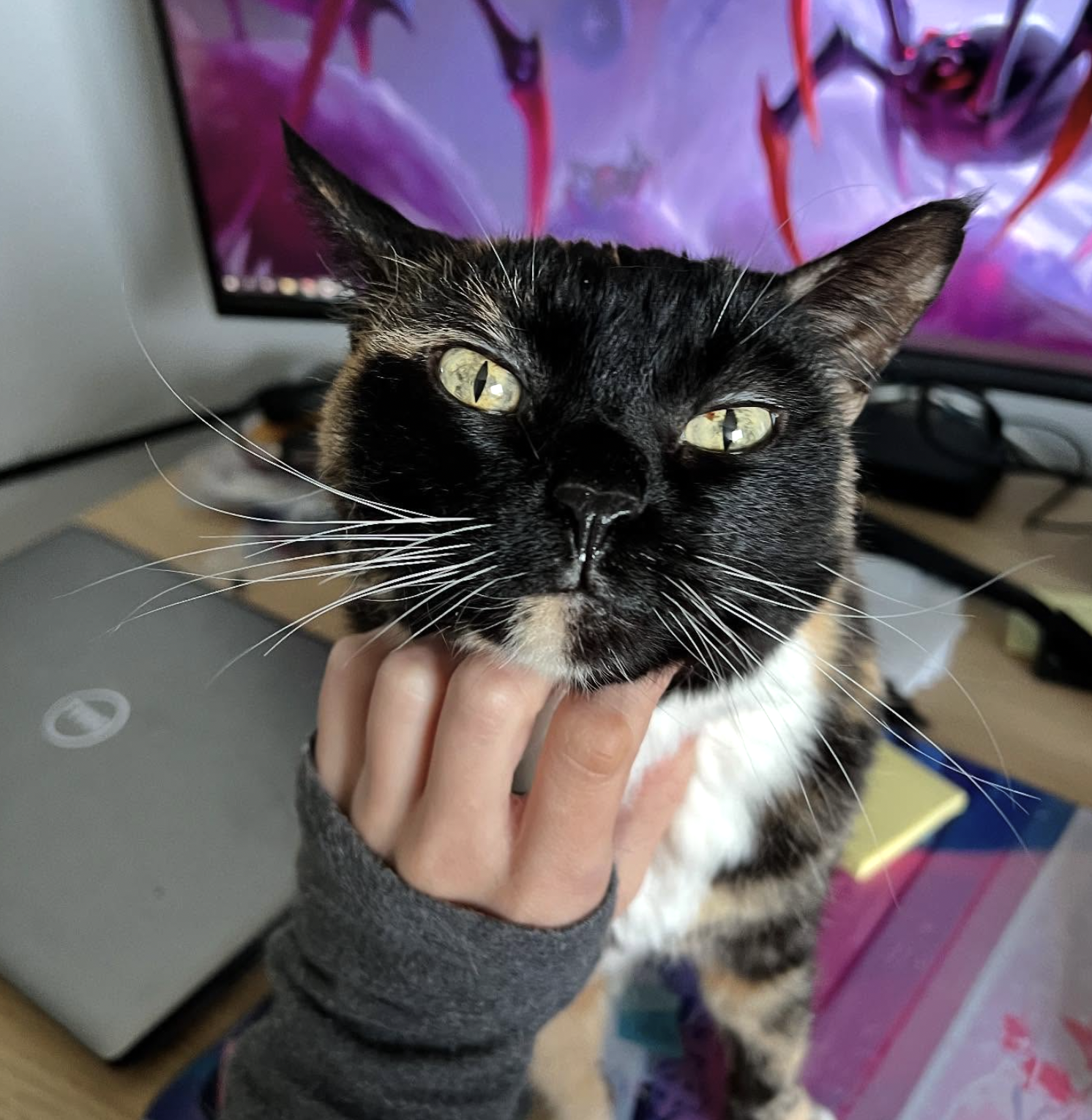
Because here’s the truth I brought back from Columbus: I don’t want the playbook of billionaires. I want the playbook of builders who sleep at night. I want the boring heroics – the accessibility fix, the stable team, the feature that makes somebody’s day 5% easier. I want rooms that reward stewardship, not just stunts.
The part where I say the quiet thing
I’m grateful to be on the list. I really am. It gave me a seat in some rooms I wouldn’t have otherwise entered, and it helped me kill a specific kind of self‑doubt earlier than I might have. But if you ask me what I want to be known for when I age out of the “under,” it isn’t the photo or the badge or the stage time.
It’s the mentees. It’s the boring, sturdy work. It’s the people who left my rooms clearer, kinder, and more dangerous in the right ways. (You know who you are.)
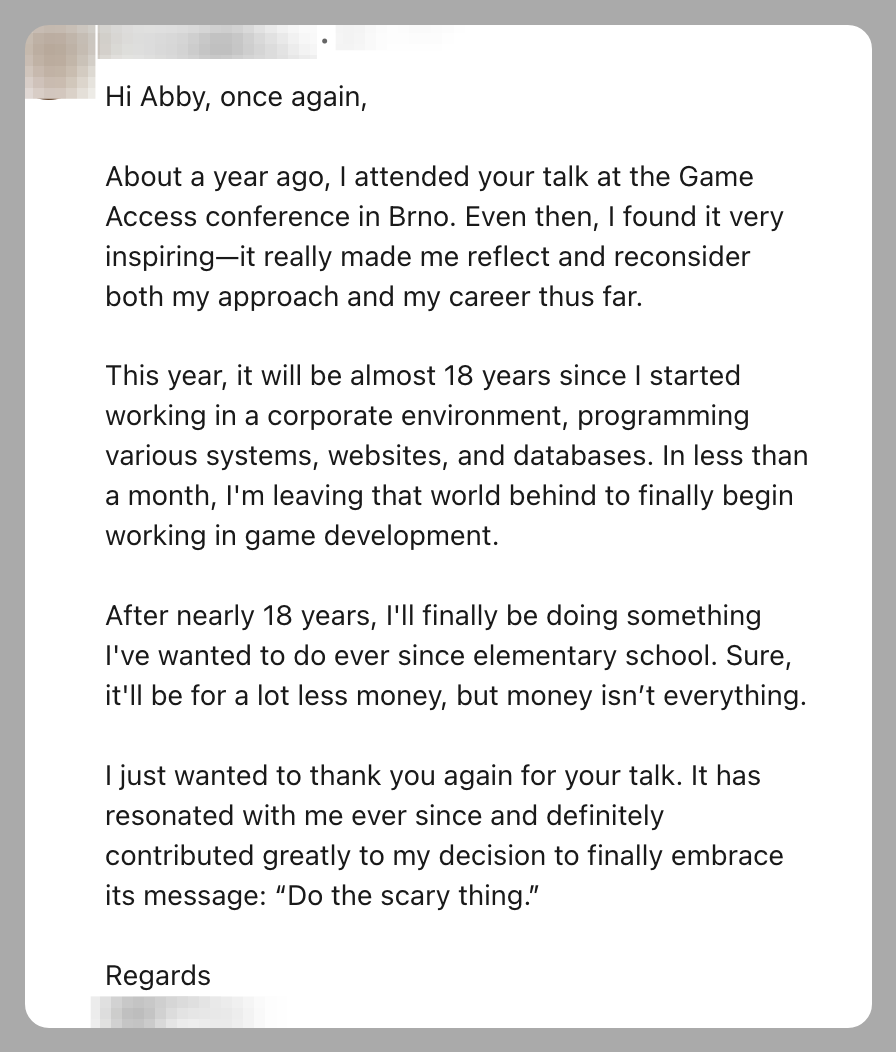
We left early so we could go back to making things. If that reads as ungrateful, I can live with it. Personally I think gratitude without judgment turns into propaganda. And we have enough propaganda inundating us everywhere we go.
On the way out of the hotel I told her the same thing I tell myself on bad weeks: just order the pizza (“get that airplane seat with the extra legroom”), and then tomorrow, go build the cool thing. The pizza (upgraded airline seats) is morally neutral. The work we're doing is not.
Subscribe for essays, updates, and the occasional unhinged production story.


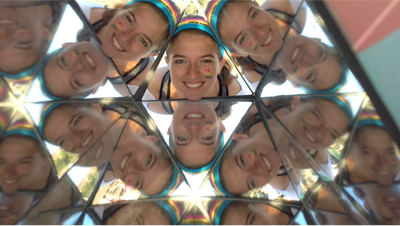
Member discussion